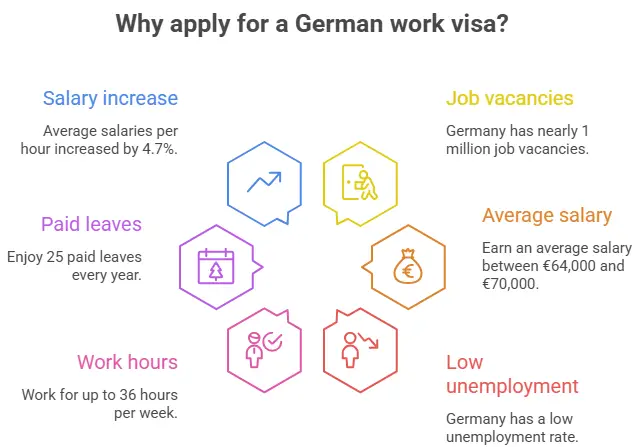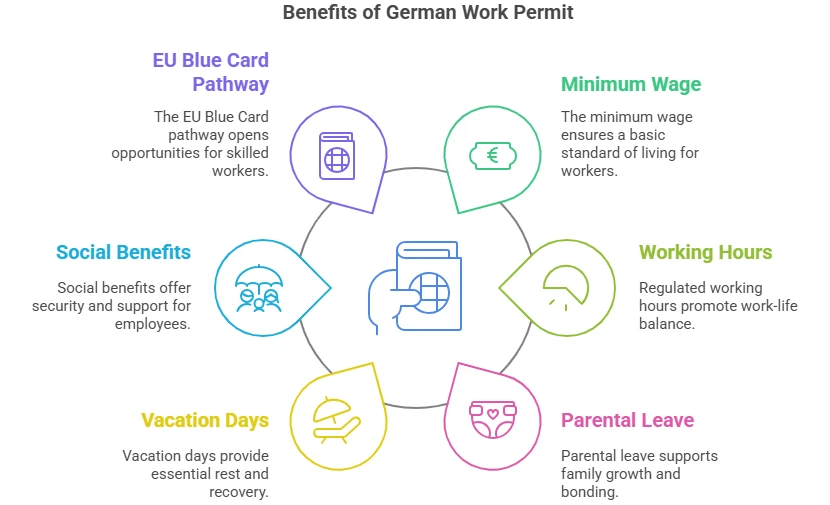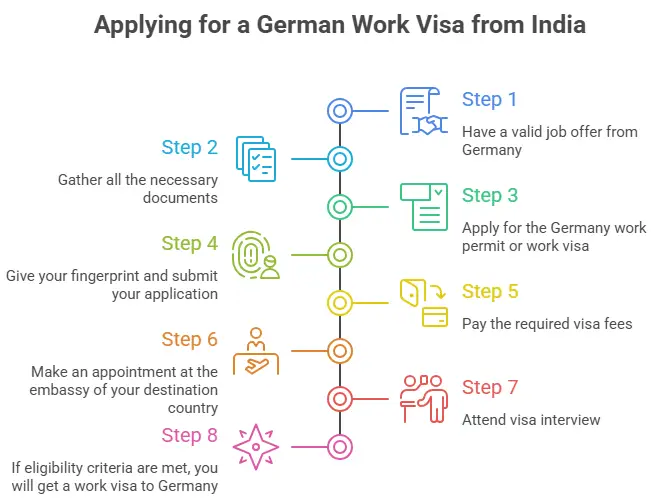Why apply for a German work visa?
- Nearly 1 million job vacancies in Germany
- Earn an average salary between €64,000 and €70,000
- Low unemployment rate
- Work for up to 36 hours per week
- 25 paid leaves every year
- Average salaries per hour increased by 4.7%

Germany is one of the top destinations for professionals willing to work abroad. The country is known for its advanced technologies, well-built infrastructure, and an ever-growing job market, which is lucrative for foreign professionals. There is a huge demand for skilled foreign workers, and recently, Germany announced a fast-track EU Blue card for Indian techies. The updated policies will offer a golden opportunity for Indian tech talents, including recent graduates and IT professionals without a university degree.
*Want to work in Germany? Begin with a guide to Migrate to Germany Flipbook.
What is a German Employment Visa?
A German employment visa, or the National D Visa, is a mandatory entry permit for non-EU/EEA/Swiss citizens to reside and work in Germany. To qualify for a German employment visa, you will need an employment offer and recognized qualifications, as well as approval from the Federal Employment Agency. The visa precedes the residence permit, often allowing visa holders to take up employment for up to 4 years, with pathways to PR.
Also, read...
What are the questions asked in a German work visa interview?
Germany Work Visa from India
Germany is a well-liked destination for jobseekers worldwide because of its growing economy, job opportunities in various sectors, and high salaries. The government offers many work visa options for international workers and is currently looking for highly skilled workers in various sectors.
Germany offers high-paying job opportunities to students and job seekers. Some of the top job sectors in Germany include:
- Mechanical and automotive Sector
- Electrical and electronics industry
- Information technology and telecommunications
- Building and construction sector
- Health sector
Also, read…
Types of German Employment Visa
Germany Opportunity Card
Candidates from non-EU countries looking for a job can enter Germany with a Germany opportunity Card. This Card does not require proof of a permanent employment contract. Candidates recognized as skilled workers or scoring at least six points using the points system are eligible for an Opportunity Card.
Also, read...
How to apply for a Germany Opportunity Card?
EU Blue Card
The EU Blue Card is considered a work permit in Germany that is issued to skilled individuals. Individuals with EU Blue Card can work in any profession that has shortage of skilled workers. EU Blue Card allows the holder to stay and work in Germany for up to four years and then extend the stay if they still meet the requirements.
*Want to apply for an EU Blue Card? Y-Axis is here to guide you with the steps.
Benefits of German work permit
Germany offers many benefits to its employees, some of which are listed below:
- In Germany, the minimum wage per hour is €12
- The average working week in Germany is 36 hours
- Parental leave allowance
- The minimum vacation right in Germany is 24 working days per year
- Enjoy social and healthcare benefits
- Pathway to obtain EU Blue Card in Germany

Also, read…
What are the most in-demand jobs in Germany for the next 10 years?
Eligibility of German work visa
You would be eligible for a German work visa if you:
- Have a valid job offer in Germany
- Earn more or equal to the minimum wage in Germany
- Have acquired your educational degree from a recognized university
- Have a valid and original passport
- Have enough health insurance coverage
- Have sufficient means to sustain yourself in Germany
Also, read...
Germany to offer 90,000 work visas to Indian professionals
German work visa requirements
The following are the documents required to apply for German work visa:
- Contract letter by a German company
- Proof you have the required education qualification
- Educational certificates
- Proof of work experiences
- Resume or CV
- Health insurance coverage for foreign workers in Germany
- A cover letter that explains your purpose for stay
Also, read...
3 Million Jobs in Germany Over the Next Decade: Job Outlook and Work Visa Options
How to apply for a German work visa from India
Step 1: Have a valid job offer from Germany
Step 2: Gather all the necessary documents
Step 3: Apply for the Germany work permit or work visa
Step 4: Give your fingerprint and submit your application
Step 5: Pay the required visa fees
Step 6: Make an appointment at the embassy of your destination country
Step 7: Attend visa interview
Step 8: If eligibility criteria are met, you will get a work visa to Germany.

Also, read...
How to apply for German work visa?
Tips to Avoid Germany Work Visa Rejection
Avoiding certain mistakes while applying for a German work visa can lead to a successful visa application, even on the first attempt. Here are certain tips to avoid German work visa rejection:
- Provide complete documentation
- Make sure to include adequate health insurance coverage
- Check for errors in the sponsorship letter
- Attach sufficient documents to demonstrate proof of funds
- Verify and cross-check to make sure the application is complete
*Want to apply for jobs in Germany? Talk to experts at Y-Axis to guide you with the steps.
Job opportunities in Germany
Germany has one of the world's most powerful economies, with more than 1 million job opportunities. Some of the highest-paying job roles in the industry are listed below:
- Computer science / IT and software development
- Electronics engineering
- Mechanical engineering
- Account management and business analytics
- Nursing and Healthcare
- Civil engineering and architecture
The table given below has the list of job opportunities along with the average salaries.
| S. No | Designation | Active No of Jobs | Salary in Euro per Year |
|---|---|---|---|
| 1 | Full Stack Engineer/Developer | 480 | €59,464 |
| 2 | Front End Engineer/Developer | 450 | €48,898 |
| 3 | Business analyst, product owner | 338 | €55,000 |
| 4 | Cyber Security Analyst, Cyber security engineer, cyber security specialist | 300 | €51,180 |
| 5 | QA Engineer | 291 | €49,091 |
| 6 | Construction engineer, Civil engineer, architect, project manager | 255 | €62,466 |
| 7 | Android Developer | 250 | €63,948 |
| 8 | Java Developer | 225 | €50,679 |
| 9 | DevOps/SRE | 205 | €75,000 |
| 10 | Customer Contact Representative, Customer Service Advisor, Customer Service Officer | 200 | €5,539 |
| 11 | Accountant | 184 | €60,000 |
| 12 | Chef, commis-chef, sous chef, cook | 184 | €120,000 |
| 13 | Project Manager | 181 | €67,000 |
| 14 | HR Manager, HR Coordinator, HR Generalist, HR Recruiter | 180 | €49,868 |
| 15 | Data Engineering, SQL, Tableau, Apache Spark, Python (Programming Language) | 177 | €65,000 |
| 16 | Scrum Master | 90 | €65,000 |
| 17 | Test engineer, software test engineer, Quality engineer | 90 | €58,000 |
| 18 | Digital Strategist, Marketing Analyst, Marketing Consultant, Social Media Marketing Manager, Growth Specialist, Sale Manager | 80 | €55,500 |
| 19 | Design Engineer | 68 | €51,049 |
| 20 | Project Engineer, Mechanical Design Engineer | 68 | €62,000 |
| 21 | Mechanical Engineer, Service Engineer | 68 | €62,000 |
| 22 | Electrical Engineer, Project engineer, Controls engineer | 65 | €60,936 |
| 23 | Manager, Director Pharma, Clinical Research, Drug Development | 55 | €149,569 |
| 24 | Data Science Engineer | 50 | €55,761 |
| 25 | Back End Engineer | 45 | €56,000 |
| 26 | Nurse | 33 | €33,654 |
Also, read…
Germany Job Market: Trends and Job Opportunities
Top in-demand occupations in Germany
Germany has a huge demand for international workers in areas such as Healthcare, Nursing, Finance, Management, Human Resources, Marketing and Sales, Accounting, Hospitality, Food Services, Manufacturing, etc. The demand for skilled and qualified workers in Germany is the major reason that it attracts immigrants from all over the world.
The list of the top 15 In-demand occupations in Germany is given below:
| Occupation | Annual salary (Euros) |
|---|---|
| Engineering | €58,380 |
| Information Technology | €43,396 |
| Transportation | €35,652 |
| Finance | €34,339 |
| Sales & Marketing | €33,703 |
| Childcare & Education | €33,325 |
| Construction & Maintenance | €30,598 |
| Legal | €28,877 |
| Art | €26,625 |
| Accounting & Administration | €26,498 |
| Shipping & Manufacturing | €24,463 |
| Food Services | €24,279 |
| Retail & Customer Service | €23,916 |
| Healthcare & Social Services | €23,569 |
| Hotel Industry | €21,513 |
Read more...
Highest paying Job Opportunities in Germany
Germany work visa from India processing time
The processing time for a German work visa takes around 1-3 months. It may vary depending on the number of applications received in the German Consulate embassy and the type of visa you are applying for.
German work visa cost from India
The processing fee for a German work visa from India costs EUR 75 and may vary depending on the type of work visa.
| Visa Category | Visa Fees |
|---|---|
| Short Stay Visa (Adults) | EUR 80 |
| Children (6–12 years of age) | EUR 40 |
| Long Stay Visa (Adults) | EUR 75 |
| Children (under age of 18) | EUR 37.5 |
| Funds Requirement | EUR 11,208 |
| Health Insurance Cost | EUR 100 to EUR 500 per month |
How Can Y-Axis Help You?
Y-Axis, the world’s No.1 Overseas Immigration Company, provides unbiased immigration services based on each client's interests and requirements.
The impeccable services of Y-Axis include:
- Free eligibility check through the German Immigration Points Calculator
- Coaching services: Expert CELPIP coaching, IELTS proficiency Coaching
- Free career consultation; book your slot today
- Complete guidance for German Immigration.
- Resume Marketing services to find suitable jobs in Germany
*Are you looking for step-by-step assistance with Germany Immigration? Contact Y-Axis, the world’s No.1 overseas immigration consultancy for end-to-end assistance!
Looking for Inspiration
Explore what Global Indians have to say about Y-Axis in shaping their future
Frequently Asked Questions
